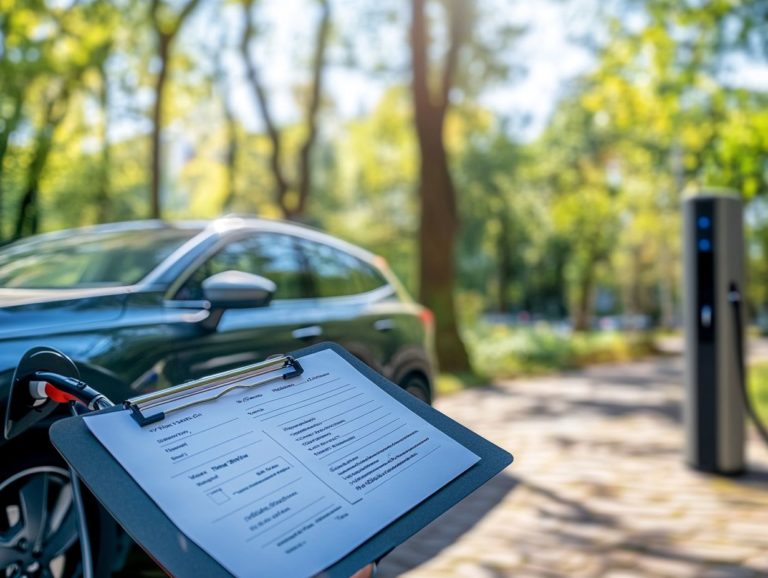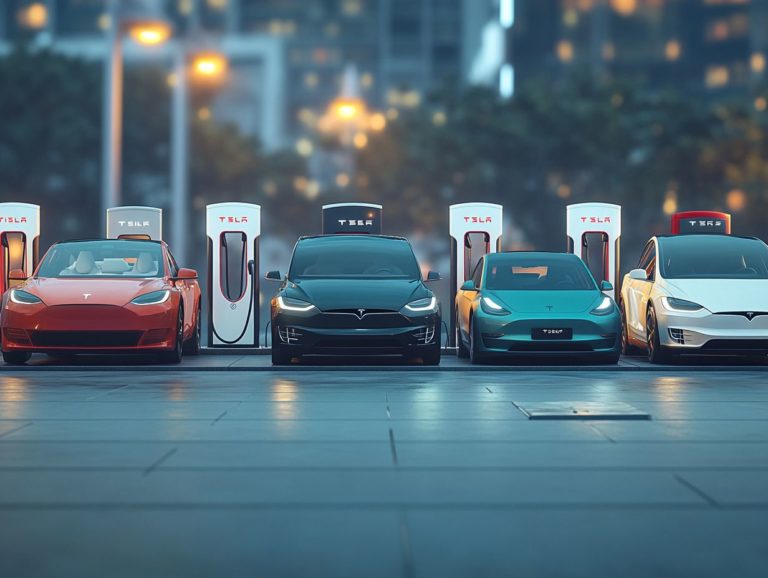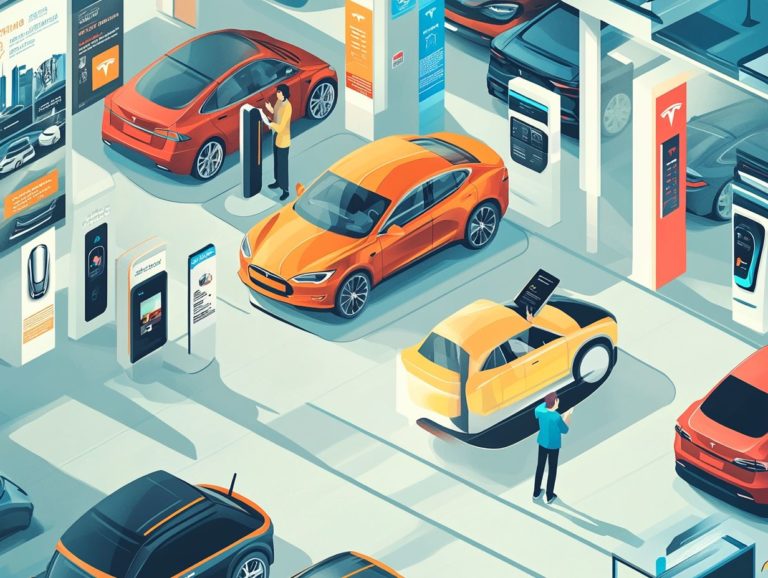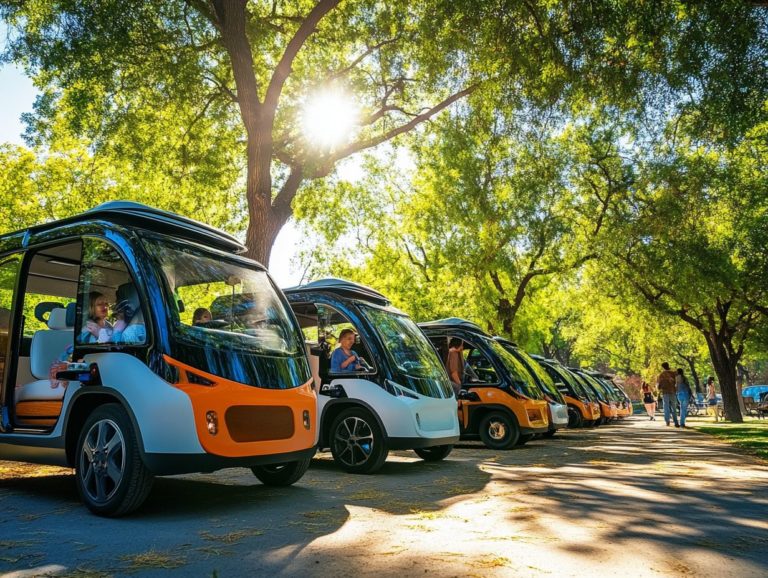EV Buying Tips: What You Need to Know
As the electric vehicle (EV) market continues to expand, now is the perfect time to explore switching to a more sustainable mode of transportation.
With a variety of EVs on the market from battery electric vehicles to plug-in hybrids the decision can feel overwhelming. This guide will break down the essential factors you should consider before purchasing an EV, including cost, range, and environmental impact.
You ll also discover available incentives, receive tips for selecting the right vehicle, and navigate the buying process with ease.
Whether you re a seasoned buyer or a first-time EV enthusiast, this guide will arm you with the knowledge you need to make a well-informed decision.
Contents
Key Takeaways:

Think about your budget, driving range, and eco-impact as you choose your EV.
Learn about the types of EVs to find one that fits your needs.
Test drive, negotiate, and prep for ownership to ensure a smooth buying process.
What is an EV?
An electric vehicle (EV) runs on electricity instead of gasoline. This includes battery electric vehicles, plug-in hybrids, and fuel cell vehicles.
Many choose electric cars for their potential to lower emissions and fuel costs. They also enhance your driving experience, especially models like the Kia EV6 and Nissan Leaf.
EVs such as the Ford F-150 Lightning and Porsche Taycan Turbo S showcase impressive performance while contributing to the evolving narrative of the future of transportation.
Factors to Consider Before Buying an EV
Before buying an electric vehicle, evaluate key factors to make the best choice. This includes addressing concerns like battery range and charging convenience, as well as learning how to avoid common EV buying pitfalls.
Knowing the EV incentives available in your state can significantly influence your buying decision.
Cost and Affordability
The cost is crucial when choosing an electric vehicle. Compare prices of new and used models along with available state and federal incentives.
Don t forget hidden costs like charging and installation; these need to be part of your financial planning.
Explore financing options like loans and leases to ease the upfront payment. It s essential to compare monthly payments for new models against used ones.
Look into federal tax credits or state rebates to lower initial costs, helping with maintenance and charging expenses in the long run.
By evaluating the total cost of ownership including battery life and potential resale value you can make informed decisions that align with your long-term financial goals.
Range and Charging Options
Range and charging options are likely at the forefront of your mind as you consider an electric vehicle. The ability of an EV to cover long distances without the constant worry of recharging is essential in easing that familiar range anxiety.
Familiarizing yourself with the public charging infrastructure is crucial for ensuring a smooth and hassle-free charging experience, whether you’re commuting or embarking on a long road trip. Fast charging networks like Electrify America can make a significant difference.
As you weigh your decision, both range and convenient charging solutions play significant roles. The option to install a home charging station means you can recharge overnight, dramatically improving your daily usability and making your mornings stress-free.
Public charging options are expanding rapidly in urban areas and along major highways. With Level 2 chargers and high-speed DC fast chargers, you can confidently plan longer journeys.
Electric vehicle technology is advancing rapidly. Now is the time to embrace these exciting changes and grasp the dynamics between range and charging capabilities for a sustainable lifestyle.
Environmental Impact

The environmental impact of electric vehicles is a crucial factor in your decision-making process, especially if you’re deeply concerned about the climate emergency and the need to reduce greenhouse gas emissions. Electric cars stand out as a cleaner, greener alternative to traditional gasoline vehicles, helping to mitigate the harmful effects of fossil fuels.
To truly grasp their ecological footprint, consider the entire lifecycle of the vehicle, including how battery materials are sourced and their sustainability. By adopting electric vehicles, you can significantly reduce carbon emissions, leading to cleaner air and healthier communities.
With zero tailpipe emissions, electric cars lower the levels of pollutants such as nitrogen oxides and particulate matter. As renewable energy sources gain traction, the electricity powering these vehicles minimizes their overall environmental impact.
Battery manufacturers are prioritizing sustainable practices that emphasize recycling and ethically sourced materials. This commitment to eco-friendly manufacturing reduces waste and drives the use of efficient materials, ultimately preserving vital ecosystems.
Available Incentives
Available incentives can greatly influence the cost of purchasing an electric car, making the switch to greener alternatives more appealing. In places like California, a variety of tax credits and rebates actively promote the adoption of EVs among residents.
Understanding these incentives enhances your budgeting skills and highlights the government s commitment to fostering sustainable transportation to combat climate change. These often include federal tax credits of up to $7,500, along with state-specific rebates that can vary significantly.
For example, California has a rebate program that offers up to $2,000 for eligible electric vehicles. Combining that with federal credits can significantly reduce the overall purchase price. But it doesn t stop there.
Additional perks like access to carpool lanes and the installation of charging stations make electric vehicles even more enticing. Many consumers in states with robust incentive programs find these financial benefits play a pivotal role in their purchasing decisions.
Ultimately, these incentives contribute to a greener automotive landscape. Take the time to research local incentives and consider a test drive of an electric vehicle!
Types of EVs Available
The market presents you with a rich selection of electric vehicles (EVs), primarily divided into two categories: Battery Electric Vehicles (BEVs) and Plug-in Hybrid Electric Vehicles (PHEVs). BEVs operate solely on electricity with no gasoline engine in sight. For example, the Nissan Leaf and Kia EV6 are notable models.
On the other hand, PHEVs, such as the Hyundai Ioniq 5, provide the flexibility to choose between electric and gasoline power. If you re seeking performance, options like the Porsche Taycan Turbo S highlight the dynamic appeal of electric mobility, catering to consumers who desire both efficiency and excitement.
Battery Electric Vehicles (BEVs)
Battery Electric Vehicles (BEVs) are entirely powered by electricity, drawing solely on the energy stored in their batteries. This lets you drive long distances without stopping for gas.
For example, the Tesla Model 3 has changed perceptions of electric cars. It offers high performance and a great driving range that appeals to a wide audience.
Thanks to advancements in battery technology, many BEVs now easily achieve ranges exceeding 300 miles on a single charge. This makes them an excellent choice for both daily commutes and longer road trips.
Not only do these vehicles help reduce greenhouse gas emissions, but they also offer lower maintenance costs compared to traditional combustion engines because they have fewer moving parts. Of course, the initial purchase price can be a hurdle for some.
When you compare models like the Ford Mustang Mach-E and the Chevrolet Bolt EV, it becomes clear that while they all deliver exceptional torque and acceleration, differences in charging infrastructure the places where you can charge your electric vehicle and technology can significantly impact your overall experience as a buyer.
By assessing these specifications, you can pinpoint which BEV perfectly aligns with your lifestyle and driving needs.
Plug-in Hybrid Electric Vehicles (PHEVs)
Plug-in Hybrid Electric Vehicles (PHEVs) seamlessly blend a traditional internal combustion engine with an electric motor. This setup offers you a versatile driving experience that accommodates both short electric trips and longer journeys without the hassle of frequent charging.
Models like the Kia EV6 and Toyota RAV4 Prime showcase the advantages of hybrid cars, providing flexibility in fuel usage while appealing to those in need of a dependable family vehicle.
This innovative setup gives you the power to effortlessly switch between electric and gasoline power, reducing your reliance on fossil fuels and minimizing emissions. The Kia EV6, with its impressive range and dynamic performance, is perfect for urban dwellers navigating stop-and-go traffic.
Meanwhile, the Toyota RAV4 Prime, known for its spaciousness and off-road capabilities, is designed for adventurous families ready to explore.
PHEVs often come with incentives like tax credits, making them an economically savvy choice compared to BEVs, which rely entirely on charging infrastructure for longer distances.
How to Choose the Right EV for You

Selecting the perfect electric vehicle (EV) requires a careful assessment of your unique needs, preferences, and lifestyle. To ensure you make the right choice, consider what to look for when buying an EV so that the car you choose aligns seamlessly with your daily activities and long-term aspirations.
Considerations such as whether you need a family-friendly option, the significance of range, budgetary constraints, and the availability of charging facilities all play critical roles in your decision-making process when contemplating the purchase of an electric car.
Explore various models and find the EV that fits your lifestyle today!
Evaluating Your Needs and Lifestyle
Evaluating your needs and lifestyle is crucial when contemplating a new electric car. This thoughtful assessment will help you determine the ideal vehicle for both your daily and long-term requirements.
Think about your family size, commuting distances, and budget. These factors guide you to the right choice that meets your expectations for performance and practicality.
Understanding your family dynamics is essential, especially when it comes to space and seating arrangements, which can greatly influence your model selection. If your driving habits are unpredictable or you frequently run errands, aspects like battery range and charging infrastructure become critical to your decision-making process.
Incorporating information about community EV incentives and local charging stations can elevate the practicality of your choice, ensuring it aligns seamlessly with your lifestyle and financial parameters. By thoughtfully considering these factors, you can make a more informed decision that balances your individual needs with the benefits offered by electric vehicles.
Tips for Buying an EV
Are you ready to buy an electric vehicle (EV)? Start by researching models and scheduling test drives to familiarize yourself with the financing options available, and consider what to know about leasing vs buying an EV.
This thorough process enriches your understanding and equips you to negotiate confidently with dealers, ensuring you land the best possible deal on your new electric car.
Researching and Test Driving
Researching and test driving different electric vehicles is an essential part of your electric car buying journey. To ensure you make an informed decision, refer to the ultimate checklist for EV buyers, which helps you evaluate options tailored to your personal preferences and needs.
Gather information on various models such as their features, performance metrics, and user reviews to make informed decisions that pave the way for a truly satisfying buying experience.
Use trustworthy sources like automotive websites and user forums. They offer insights on the pros and cons of each model.
During your test drives, focus on key features like acceleration, battery range, and interior comfort, along with tech amenities like infotainment systems and safety ratings.
Evaluating these aspects helps you identify which electric vehicle best suits your lifestyle and significantly enhances your overall satisfaction with the purchase.
Negotiating and Financing
Negotiating and financing are crucial elements of the electric car buying journey, as they can profoundly influence both the overall cost and your satisfaction with the purchase.
Know the available EV incentives. This knowledge gives you the power to negotiate effectively and secure a favorable deal on your ideal vehicle.
Having a solid understanding of current market trends and available incentives can give you a significant edge. Many manufacturers offer enticing tax credits and rebates that can substantially reduce the final price, yet not all buyers take the time to explore these benefits.
Acquainting yourself with various financing options such as low-interest loans or leasing enables you to engage in more strategic discussions with dealers and lenders. Being well-informed boosts your bargaining power and instills confidence throughout the transaction.
Ultimately, thorough research and preparation can lead you to a more satisfying and economical purchasing experience.
What will you prioritize when choosing your new electric vehicle?
Preparing for Ownership
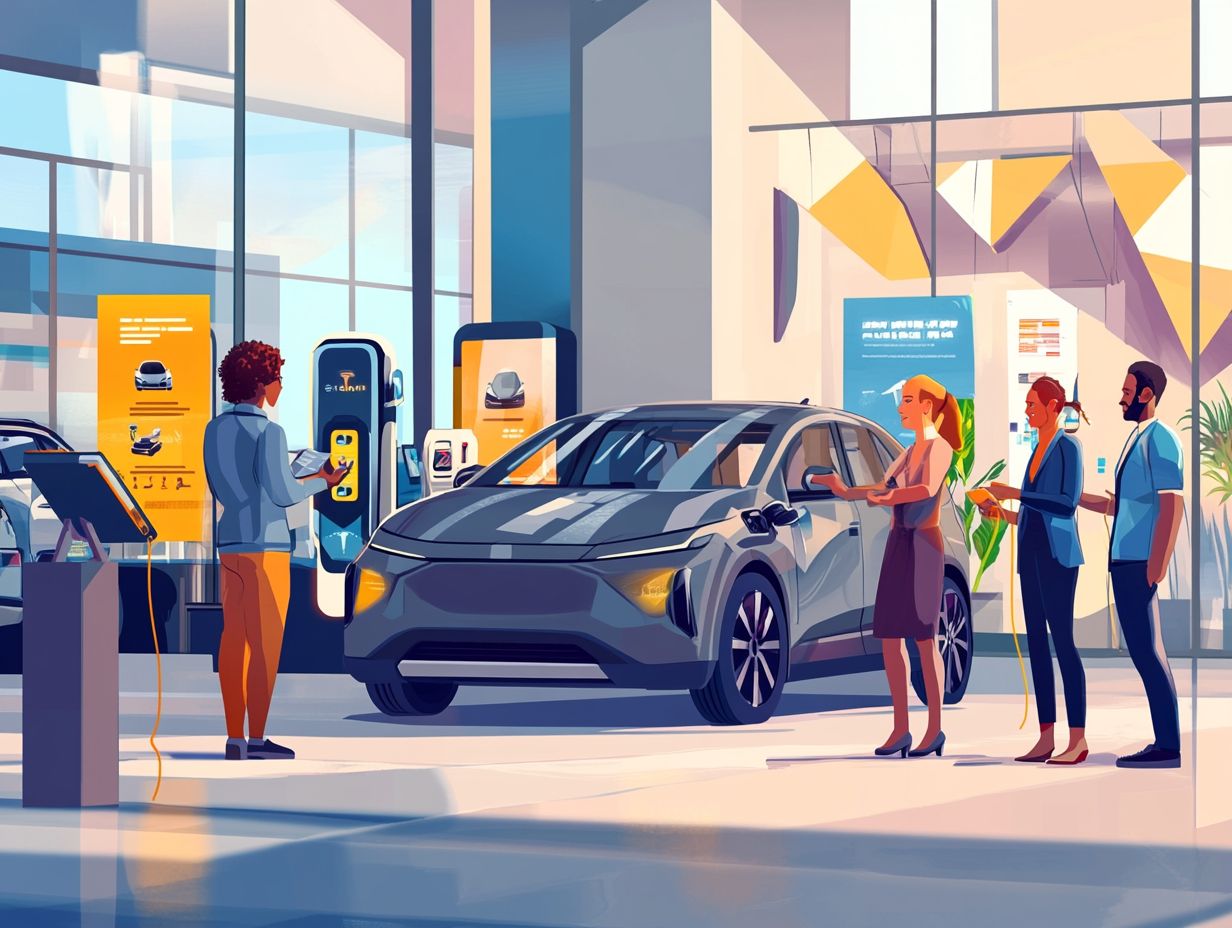
Preparing for the ownership of an electric vehicle (EV) means you’ll need to grasp the unique aspects of electric car maintenance. This involves understanding the charging experience, battery warranties, and the regular upkeep required to optimize performance. For more detailed guidance, check out how to choose the right EV for your lifestyle. Being well-informed about these elements will ensure a seamless transition into EV ownership and enhance your satisfaction with the vehicle.
You ll want to explore the various charging options available to you. This includes home chargers and public stations, which are essential for your daily driving convenience. Familiarizing yourself with battery care practices that extend lifespan and efficiency is crucial. This includes developing appropriate charging habits and managing temperature effectively.
It’s essential to keep up with maintenance for your EV, as ongoing requirements can differ significantly from traditional combustion engines. To ensure you’re meeting your vehicle’s unique demands, consider learning how to determine your EV needs. By taking these proactive steps, you can elevate your driving experience and feel confident in your eco-friendly investment.
Frequently Asked Questions
What is an EV?
An EV, or electric vehicle, is a type of vehicle that uses one or more electric motors for propulsion. These vehicles run entirely on electricity and do not require gasoline or diesel fuel.
What are the benefits of buying an EV?
There are several benefits to buying an EV. They are better for the environment, as they produce zero emissions. They also have lower operating costs because electricity is generally cheaper than gasoline. EVs offer a smoother and quieter driving experience, which many drivers appreciate.
How do I know if an EV is right for me?
If you want to reduce your carbon footprint, save money on gas, and enjoy a more efficient driving experience, an EV may be right for you. To ensure a smooth transition to electric vehicle ownership, be sure to check out our guide on how to prepare for EV ownership transition. Consider your daily commute, access to charging stations, and budget when making your decision.
What should I consider when choosing an EV?
When choosing an EV, consider factors such as range, performance, charging options, and price. Additionally, understanding EV charger compatibility is crucial. Research different models to determine which features are most important to you.
Do I need to install a charging station at home?
While it is not required, having a home charging station is recommended for convenience. A standard outlet can be used to charge your EV, but a dedicated charging station will provide faster and more reliable charging.
Are there any incentives for purchasing an EV?
Yes, there are often incentives and rebates available for purchasing an EV. These can vary by state and country, so research what is available to you. Additionally, some employers offer charging stations and discounts for employees who drive EVs.
Ready to make the switch? Explore your options today!


